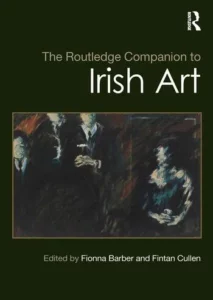Book Launch: Routledge Companion to Irish Art

- This event has passed.
Book Launch: Routledge Companion to Irish Art
June 25 @ 4:30 pm – 6:00 pm

Please join us to celebrate the launch of the Routledge Companion to Irish Art (2025) edited by Dr Fionna Barber (Reader in Art History, Dept of Art and Performance, Manchester Metropolitan University) and Dr Fintan Cullen (Emeritus Professor of Art History, University of Nottingham). The launch is hosted by the Visual Culture Research Group at MMU.
The event will take place in the First Floor Open Space, Righton Building. Please register by 18th June if possible so we can have an idea of numbers for catering.
Following a short introduction by Susannah Thompson, Professor of Fine Art, MMU, the book’s two editors Fionna Barber and Fintan Cullen will talk about the scope of the book, and its significance for studies of Irish art from the beginnings of the 19th c to the present day, in addition to reflecting on the process of commissioning, and editing such a large volume. Dr Matt Retallick (Lecturer in Art History and Curating, MMU) will also talk about his experience of contributing a chapter to the Companion.
There’ll also be time for more informal discussion with refreshments provided.
This is the first publication of a companion to Irish art and its history. Its forty-four commissioned essays comprise a sustained critical commentary on a range of topics across a period from c.1800-2020. This companion contains new and innovative writing that critically engages with Irish art in a period linked to key events in Irish history, beginning with the Acts of Union between Britain and Ireland (1800–01)) and the significant social and cultural changes that resulted. The book also provides a precedent for a focus on the significance of art in relation to other subsequent key historical events such as the early twentieth‑century struggles for independence or the role of political conflict in Northern Ireland from the late 1960s onwards and its aftermath. Key themes covered include tradition and innovation; upheavals of history; place, location, and artistic formations; Irish art and the wider world; and embodiment and identity. The book expands the critical discourse around Irish art over this period, both within Ireland and beyond, and encourages the potential for future scholarship in fields and periods not covered.
This book will be of interest to scholars and students working in art history, Irish studies, and colonial studies.
Please register by 18th June if possible so we can have an idea of numbers for catering.
Contact: Fionna Barber or Matt Retallick for further details
